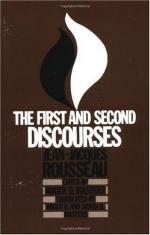|
This section contains 494 words (approx. 2 pages at 400 words per page) |

|
Chapter 2, A Discourse on the Moral Effects of the Arts and Sciences, Part II Summary and Analysis
The Second Part of the First Discourse opens with the claim that civilizations have often held that science begins with superstition, a common enemy of the people. Pride generates ethics, greed generates geometry and idleness produces physics. Evils that lead to the production of sciences are reflected in the science produced. Arts need riches and injustice is needed for the law. Without tyrants and wars, history would be of no importance.
Science has alarming consequences. It produces laziness and prevents the production of worldly goods. As we increase in knowledge, we generate more time for vice. Work matters little toward producing virtue. Rousseau sees true laziness regressing men to the state of nature. Time spent...
|
This section contains 494 words (approx. 2 pages at 400 words per page) |

|




